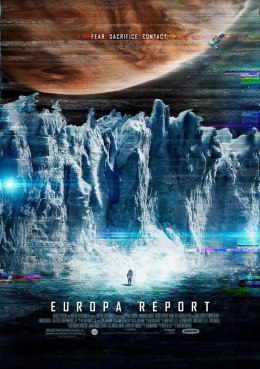
Normally, the juicy phrase “ripped from the headlines” applies to TV shows like Law & Order or The Newsroom, with real events incorporated into plotlines (and of course, sexed up a bit—often literally—for storytelling purposes).
It’s a lot less common in science fiction. But on the first day of principal photography for the new feature film Europa Report, astronomers announced they’d found evidence for lakes of liquid water trapped within the icy shell of Jupiter’s moon Europa. For scientists, this was a big deal: they already knew a vast ocean lies beneath Europa’s frozen crust. Since liquid water is considered crucial for life, this made the icy moon a prime place to look for alien organisms—and the lake, even closer to the surface, would be more accessible for an eventual mission trying and find them.
In real life, such an effort is years away; even NASA’s Europa Clipper, which has yet to be approved, would only swing by the Jovian moon, not touch down. A more ambitious mission to drill through the ice and take samples is probably decades hence.
Not in Europa Report, though. The film is set in the very near future—it could even be today—and six astronauts are on their way to go sleuthing for organisms, funded by a private company called Europa Ventures (again, not so implausible considering that space entrepreneur Elon Musk is talking seriously about sending tourists to Mars someday).
(MORE: A Living Ocean on a Jovian Moon?)
The story, shot in an absurdly quick 19 days on a Brooklyn, New York, soundstage, chronicles the journey in a somewhat non-chronological fashion (though, fair warning, chronological spoilers do follow here). We learn right away that controllers back on Earth have lost contact with the explorers, but don’t learn why—it’s a huge coronal mass ejection from the Sun, which fries their electronics—until later on. Two astronauts go on a spacewalk to try and repair the damage. If you’ve ever seen an actual spacewalk, this one looks absolutely real. Unlike all real spacewalks to date, however, it doesn’t end well.
Things get dicier when the spacefarers land successfully on Europa. Sure enough, on drilling down into the water they find algae-like organisms. It’s arguably, says one of the crew, “the most profound discovery in human history.”
Plenty of real-world scientists would agree. The search for life beyond Earth is now proceeding on many fronts, sparked largely by the boom in discoveries of planets orbiting distant stars that began in the 1990’s. The existence of so-called exoplanets was a critical start, since alien life needs a place to live, but it’s also crucial to know how easily life will arise when the proper ingredients—water, organic molecules and a source of energy—come together. If it’s a zillion-to-one shot and Earth just got lucky, there may well be virtually nothing out there to find.
(MORE: A Brand New Ocean—On Saturn’s Moon Titan)
But if life is easy to spark, it’s everywhere. Single-celled organisms are the simplest things to make, so you’d expect algae or bacteria or some other equally uncomplicated creatures to be the most common. Some places would inevitably have gone on to evolve more complex life-forms, however, meaning that once you find something as crude as extraterrestrial algae, the odds soar that there are thinking creatures at large too. A discovery of any life at all in our own Solar System, moreover—pretty much the first place we can look—would almost guarantee a Milky Way positively teeming with biology.
If Europa were to harbor even more complex organisms, well, that would be a jackpot right in the neighborhood. The algae in Europa Report come about an hour into the 90-minute film, and they’re not by any means the climax. In Stanley Kubrick’s classic 2001: A Space Odyssey, Europa is also the ultimate focus—and it turns out to be a more dangerous place than anyone expected. Europa Report sees similar menace on the icy moon.
Kubrick’s masterpiece moved so slowly that it was something of an endurance test, even for avid sci-fi fans. Europa Report, by contrast, is brisk, thrilling and ultimately terrifying. And unlike 2001, it’s (mostly) grounded firmly in one of the most exciting areas in modern science. The idea that life evolved independently on Europa is perfectly plausible—and that makes what would be a fun and exciting film in any case all the more worth watching.
(MORE: Lasers Could Help Cryobots Melt Through Ice on Europa)

